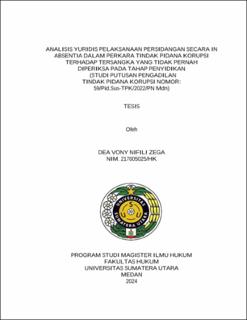Analisis Yuridis Pelaksanaan Persidangan Secara In Absentia dalam Perkara Tindak Pidana Korupsi terhadap Tersangka yang Tidak Pernah Diperiksa pada Tahap Penyidikan (Studi Putusan Pengadilan Tindak Pidana Korupsi Nomor: 59/Pid.Sus-TPK/2022/PN Mdn)
Juridicial Analysis of the Implementation of Trail in Absentia in the Case of Corruption Criminal Act Agains the Unexamined Suspect in Investigation Stage (Study on the Decision of Criminal Corruption Court Nomber : 59/Pis.Sus-TPK/2022/PN Mdn)

Date
2024Author
Zega, Dea Vony Nifili
Advisor(s)
Mulyadi, Mahmud
Sukarja, Detania
Trisna, Wessy
Metadata
Show full item recordAbstract
In handling cases of criminal acts of corruption, special rules are imposed that stipulate that without the presence of defendants who have been legally summoned at the court hearing, the trial can still proceed with trial in absentia as stipulated in Article 38 paragraph (1) of Law of the Republic of Indonesia Number 31 of 1999 concerning the Eradication of Criminal Acts of Corruption. However, this provision does not formulate and regulate the investigation of corruption cases in absentia. The purpose of this thesis is to analyze and know the importance of trial in absentia in cases of criminal acts of corruption, to analyze and know the implementation and opportunities and challenges of trials in absentia in cases of criminal acts of corruption against suspects who have never been examined at the investigation stage.
The research method used in this thesis is normative research with primary data collection and secondary data using literature study techniques and field studies then the data obtained are analyzed descriptively qualitatively.
The urgency of trial in absentia in corruption cases is to realize legal justice in terms of saving state wealth through the return of assets resulting from corruption crimes, providing benefits for many people who have been harmed by social and economic rights as a society. The implementation of trials in absentia in corruption cases as decided in the Corruption Court Decision Number: 59/Pid.Sus-TPK/2022/PN Mdn does not only occur in the court examination process but has begun since the investigation stage, where the Suspect is no longer known or has fled after being determined as a Suspect. The trial in absentia of corruption cases against suspects who have never been examined at the investigation stage provides opportunities for the recovery of state financial losses, speeds up the completion of legal proceedings and to provide a deterrent effect on perpetrators of corruption crimes. The challenges of implementing trials in absentia of corruption cases in terms of legal substance, legal structure, legal culture and fulfillment of human rights.
Collections
- Master Theses [1848]
